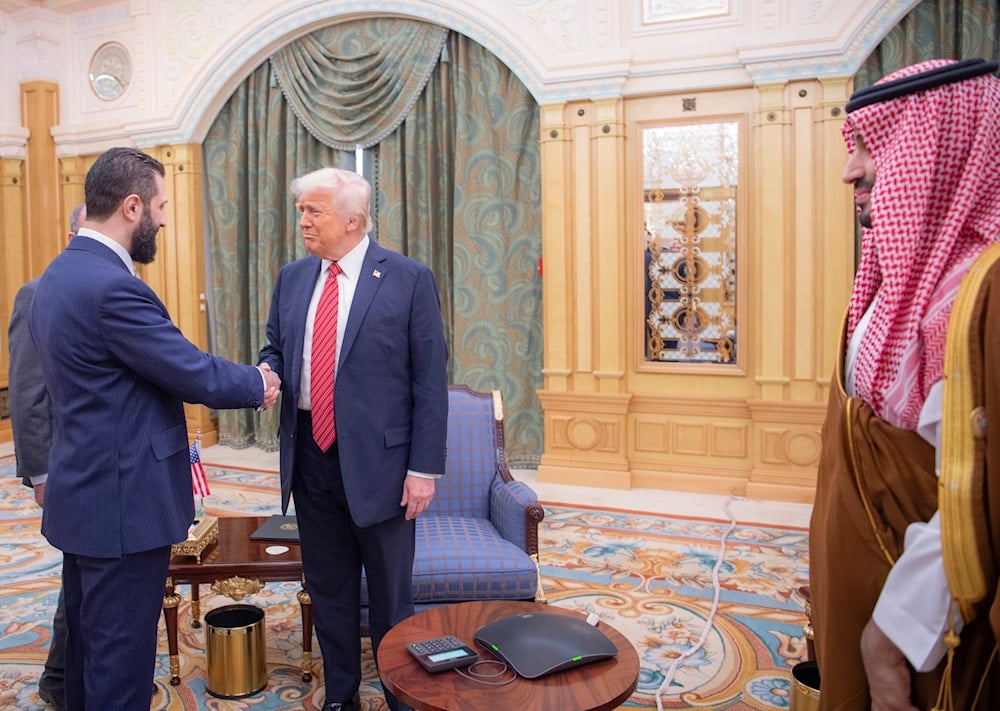'Israel' blindsided by Trumps' Syria sanctions lift: The Times
From the Gulf states, Trump has embarked on a surprising shift in US foreign policy that blindsided "Israel' and could reshape the Middle East.
-

In this photo released by the Saudi Royal Palace, Syria's interim President Ahmad al-Sharaa, left, shakes hands with President Donald Trump, centre, in Riyadh, Saudi Arabia, Wednesday, May 14, 2025 (AP)
"Israel" has been blindsided by the president of the United States, Donald Trump, who announced a total lifting of US sanctions on Syria on Tuesday and met with the Syrian interim President Ahmad al-Sharaa on Wednesday, according to The Times.
At the urging of Saudi and Turkish leaders, whom the US president considers allies, he agreed to meet with al-Sharaa, a figure still designated as a terrorist by the US, and to lift sanctions on Syria that had been imposed on the former regime under former President Bashar al-Assad.
US announcement worries 'Israel'
The new Syrian interim president traveled to Paris earlier this month for talks with President Macron, who indicated European sanctions on Syria could be gradually eased, provided that Damascus demonstrates a commitment to implementing legal and democratic reforms.
While other nations like Britain had already started easing sanctions and the US had allowed allies, including Saudi Arabia and Qatar, to provide aid to Syria in recent months, a complete lifting of US sanctions remained unexpected as supporters maintained this pressure was necessary to guarantee al-Sharaa's genuine reform and cooperation with Washington.
Israeli Prime Minister Benjamin Netanyahu may fear a widening rift with Trump, especially as Arab leaders, who will also push Trump to end the war on Gaza, seek to exploit the divide, The Times said in a Wednesday report.
The Times highlighted that "Israel" had worked to keep al-Sharaa isolated and launched airstrikes on Syria amid his crackdown on Syria's Druze minority while setting up a "security zone" along the border after al-Assad's fall. Additionally, "Israel" urged the demilitarization of southern Syria all the way to Damascus.
Instead, they witnessed Trump shake hands with al-Sharaa on Wednesday, following the president's unexpected announcements that he would begin negotiations with Iran and halt the US air campaign against Yemen's Ansar Allah, decisions that caught "Israel" completely off guard.
Implications of Trump's endorsement of al-Sharaa
Trump's endorsement will reduce pressure on al-Sharaa, especially that his supporters had worried that the sanctions, which have crippled the economy and worsened living conditions, could spark new unrest and deepen the country's divisions.
During their meeting, Trump pressed al-Sharaa to curb militant groups and expel foreign fighters, some of whom al-Sharaa had floated granting Syrian citizenship, while also demanding he establish diplomatic relations with "Israel", though both requests may be politically untenable for al-Sharaa to fulfill, according to the report.
The Times stated that critics will contend that Trump’s meeting with al-Sharaa, and even his proposal for a Trump Tower in Damascus, represents a premature embrace of a leader whose victory over al-Assad relied on hardline Islamist fighters, many of whom operate outside his direct command.
In March, these same hardline fighters launched widespread massacres targeting civilians belonging to the Alawite minority, killing around 1,500 civilians, according to the Syrian Observatory for Human Rights.
Al-Sharaa’s supporters, Saudi Arabia and Qatar, maintained that engaging Syria’s new leadership remained the optimal path for regional stability, arguing the country had long served as both a source of unrest and a keystone in Iran’s contested "Axis of Resistance," ultimately convincing Trump to align with their position.
The Times concluded by saying that the US opening to Syria could also undermine Russia, once an al-Assad ally, which sought to retain its bases in exchange for aid and recognition. Al-Sharaa has avoided expelling Russian forces, viewing them both as potential allies and leverage with Washington.

 4 Min Read
4 Min Read









